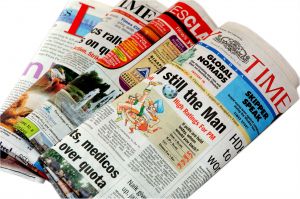 Welcome to the news of the 21st Century, ladies and gentlemen. I was working late last night and flipped over to Twitter and saw it light up with information about the Boston suspects, MIT, and a shoot-out either on or around campus. People were linking to the police scanner, web-pages were transcribing events as they took place, and some people were close to being on scene to describe what they were either hearing or seeing.
Welcome to the news of the 21st Century, ladies and gentlemen. I was working late last night and flipped over to Twitter and saw it light up with information about the Boston suspects, MIT, and a shoot-out either on or around campus. People were linking to the police scanner, web-pages were transcribing events as they took place, and some people were close to being on scene to describe what they were either hearing or seeing.
Of course, just yesterday, law enforcement officials posted the photos of the bombing suspects and within seconds they could be accessed by anyone with a smart phone. We are no longer stopping at the Post Office to find out who is “most wanted,” are we? Welcome to the New Media. (As a side note, how could anyone survive for long in a city as a fugitive in this day and age?)
Pete Williams, of NBC, is being hailed for his handling of Boston’s breaking news during the past week. Williams acted responsibly when choosing not to report information, like the impending arrest of suspects, that was unverified. CNN, on the other hand, has struggled to balance the demands of speed and accuracy.
Let me say, clearly, that I do not envy the people making these second by second choices about what to air or not. Breaking news is hard to cover, especially on television. Cable news stations, in particular, seem unable to resist new information, no matter how flawed, because they have to fight against dead air. Dead air leads to reporters talking to each other and experts being trotted out with few known facts. This leads, too often, to speculation.
There was a time, boys and girls, when the news cycle was more like a week. Magazines did in-depth reporting, newspapers dug daily, and tv talking heads would draw things together and given them a nice, visual sheen. Newspapers, in this environment, broke news upon publication in the morning or afternoon, depending on their schedule. At minimum, then, a reporter would have several hours to write and research something before the paper ran with the information. Television then still largely borrowed the newspapers’ agendas and did little original, investigative reporting.
With the advent of cable news, the cycle became 24 hours, with seemingly endless amounts of air-time to fill. With that time came the ability to focus on live, breaking events with little disruption to other programming. Unlike the networks, which had to balance pulling people away from their soap operas with the need to report breaking news, cable channels had no constraints. In fact, this became one of their major selling points for news junkies who wanted to ride the wave of new information. As a result, tv news slowly pulled away from the newspapers’ ethic of being “right” as opposed to first. Now, to be first is to get ratings and to be right is to wait and watch the audience slide away.
The internet, of course, accelerated the dynamics significantly. Not only was more information available, from more sources, it was available instantly across a variety of platforms. The internet has also bitten into the media’s advertising, so newspapers and magazines are either closing or getting leaner and/or purely digital. Throw into this mix the advent of social media, where every citizen armed with a phone and a Twitter account becomes a possible source of information within an instant. This leads to a massive compression for news gatherers and commentators. Decisions cannot take hours or days, but must be made in minutes or seconds. Credibility must be established and a decision has to happen. NOW!
The interesting question for me is what will all of this look like in five or ten years? Remember, ten years ago, there was no Facebook or Twitter. What platforms will exist and how will they integrate themselves into the news media? I am certain the media will survive this and emerge in a strong position, but the shift will have to be away from information gathering and toward credible analysis. I am hopeful that objective, thoughtful sources of both will be able to carve out a living in the new media world, but we will see.
 Bert Wheeler
Bert Wheeler
 Jeff Haymond
Jeff Haymond
 Marc Clauson
Marc Clauson
 Mark Caleb Smith
Mark Caleb Smith
 Tom Mach
Tom Mach